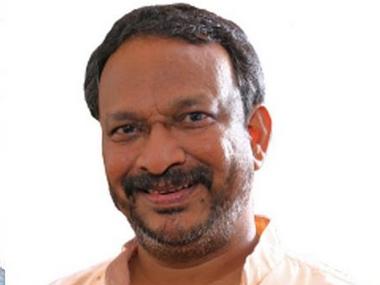Cleaners of dry latrines or ‘safaiwala’, is how we glaze over the job description of manual scavengers. But the actual job entails cleaning human excreta with bare hands and carrying it to the disposal site in overhead baskets. The profession, though outlawed by the Indian Constitution in 1993, is still the primary occupation of over 180,000 Dalit families, according to the 2011 census data. And even today, 300,000 more would have still been caught up in the quagmire, if not for the efforts of a 50-year-old Dalit social activist from Karnataka.
Bezwada Wilson, a social activist working for abolition of the dehumanising practice of manually cleaning human excreta and toilets, was on Wednesday chosen to be felicitated with the Ramon Magsaysay Award 2016 for “asserting the inalienable right to a life of human dignity.”
A Dalit born into a family of manual scavengers in Karnataka, Wilson had seen his parents clean toilets as a boy. Although he was spared the labour and given a chance to pursue higher education, the profession followed by his family and caste haunted his identity as a teenager. He was discriminated against, looked down upon as a child. According to the citation of the Magsaysay Award, he was “treated as an outcast in school and acutely aware of his family’s lot, Bezwada was filled with great anger; but he would later channel this anger to a crusade to eradicate manual scavenging.”
And it was this discrimination and the pain of a shared blotched identity that would help him strike a chord with other manual scavengers and organise a mass movement against the profession.
In an interview given to Business Standard in 2007, Wilson recounts the turning point in his life that angered him towards the injustice of the system. Then a 17-year-old boy, Wilson was pained to see the women and even children working through the night soil with their bare hands, unfazed by the horrible stench that surrounded them. He says everybody used to consume alcohol to be able to stand the foul smell. Wilson used to reason out with them, asking them to stop doing the work. But on one sweltering summer day, when it was especially hard to scrape off dried excreta, he broke down while asking some of the workers to stop cleaning. That incident strengthened his intent to change things.
Wilson understood that merely asking his friends and family to stop doing the work will not solve anything. The problem was much more complex. “I was such a fool: What did I expect them to say? That they would give up their livelihood, the only thing they knew how to do? The only thing society tells them they can do?” Business Standard quotes him as saying.
Resolved to put an end to this discrimination, in 1986, Wilson started by convincing his neighbours and family that being a Dalit was a status imposed and not their fate. He actively campaigned and opposed humans cleaning the excreta of fellow humans. According to the citation at the Magsaysay Award website, Wilson complained against dry toilets and wrote to the Prime Minister, as a result of which all such toilets in his districts were replaced with water-seal latrines. Emboldened by this, he expanded his efforts to other states in India and created a mass movement against the dehumanising practice, which was later known as Safai Karmchari Andolan (SKA).
Today, Bezwada Wilson is a well-known name as one of the handful of crusaders for the cause of manual scavengers. Of the estimated 600,000 scavengers in India, SKA has liberated around 300,000 and helped them to move on to other professions, according to the citation of the Magsaysay Award. He has trained thousands of volunteers across the country and fought vehemently against the practice within the legal framework of the country. In 1993, he sued the Union of India and various state governments for not following its own rules, which outlaws dry latrines and manual scavenging. The court ruled in his favour.
Wilson was also instrumental in the framing of the new law in 2013 that provides for a rehabilitation support system for scavengers. In an interview to the Youth Ki Awaz , he says SKA worked hard to ensure the enforcement of the Employment of Manual Scavengers and Construction of Dry Latrines (Prohibition) Act, 1993. They approached the Supreme Court, which asked for state-wise data but the states went into denial. So SKA finally demolished dry toilets in states like Andhra Pradesh, Karnataka and Rajasthan. According to his profile in Outlook , Bezwada Wilson will not rest until he has demolished the last one in India.
But the situation is still far from satisfactory. Although there are government schemes in place to aid the rehabilitation process of manual scavengers, comprehensive rehabilitation is not picking up. According to PIB , One Time Cash Assistance of Rs 40,000 has been credited into the bank accounts of about 6,600 manual scavengers. So far, 12 states have identified about 12,000 manual scavengers. However, in comparison to the ground reality, the official numbers are too small. It is not even in agreement to the data put out by the government census, which puts the number of manual scavengers at 1,82,505.
Taking cognisance of Wilson’s work in emancipation of manual scavangers, the Magsaysay Award has also flagged manual scavenging as a dehumanising practice that must be eradicated.


)




)
)
)
)
)
)
)
)